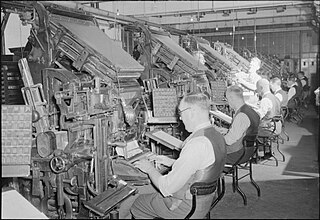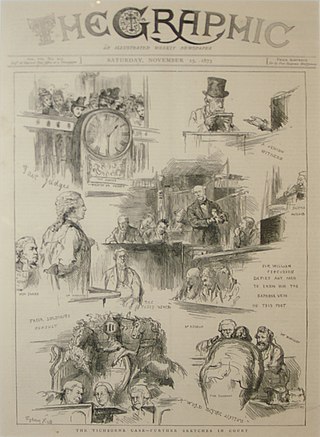Related Research Articles

The history of British newspapers begins in the 17th century with the emergence of regular publications covering news and gossip. The relaxation of government censorship in the late 17th century led to a rise in publications, which in turn led to an increase in regulation throughout the 18th century. The Times began publication in 1785 and became the leading newspaper of the early 19th century, before the lifting of taxes on newspapers and technological innovations led to a boom in newspaper publishing in the late 19th century. Mass education and increasing affluence led to new papers such as the Daily Mail emerging at the end of the 19th century, aimed at lower middle-class readers.

Janet Vera Street-Porter is an English broadcaster, journalist, writer, and media personality. She began her career as a fashion writer and columnist at the Daily Mail and was later appointed fashion editor of the Evening Standard in 1971. In 1973, she co-presented a mid-morning radio show with Paul Callan on LBC.

Roy Herbert Thomson, 1st Baron Thomson of Fleet, was a Canadian-born British newspaper proprietor who became one of the moguls of Fleet Street in London.
Daily Mail and General Trust (DMGT) is a British multinational media conglomerate, the owner of the Daily Mail and several other titles. The 4th Viscount Rothermere is the chair and controlling shareholder of the company. The head office is located in Northcliffe House in Kensington, London. In January 2022, DMGT delisted from the London Stock Exchange following a successful offer for DMGT by Rothermere Continuation Limited.
The News Chronicle was a British daily newspaper. Formed by the merger of The Daily News and the Daily Chronicle in 1930, it ceased publication on 17 October 1960, being absorbed into the Daily Mail. Its offices were at 12/22, Bouverie Street, off Fleet Street, London, EC4Y 8DP, England.

The Graphic was a British weekly illustrated newspaper, first published on 4 December 1869 by William Luson Thomas's company Illustrated Newspapers Ltd. Thomas's brother Lewis Samuel Thomas was a co-founder. The premature death of the latter in 1872 "as one of the founders of this newspaper, [and who] took an active interest in its management" left a marked gap in the early history of the publication. It was set up as a rival to the popular Illustrated London News.

Cherwell is a weekly student newspaper published entirely by students of Oxford University. Founded in 1920 and named after a local river, Cherwell is a subsidiary of independent student publishing house Oxford Student Publications Ltd. Receiving no university funding, the newspaper is one of the oldest student publications in the UK.

The Kingston Whig-Standard is a newspaper in Kingston, Ontario, Canada. It is published four days a week, on Tuesday and Thursday to Saturday. It publishes a mix of community, national and international news and is currently owned by Postmedia. It has ISSN 1197-4397.
Emmanuel Bankole Timothy was a Sierra Leonean journalist. He was also an author and wrote biographies of Albert Margai, prime minister of Sierra Leone (1964–67), and Kwame Nkrumah, president of Ghana (1960–66). Timothy served for many years as editor of the Daily Graphic in Accra.

Roy Greenslade is a British author and freelance journalist, and a former professor of journalism. He worked in the UK newspaper industry from the 1960s onwards. As a media commentator, he wrote a daily blog from 2006 to 2018 for The Guardian and a column for London's Evening Standard from 2006 to 2016. Under a pseudonym, Greenslade also wrote for the Sinn Féin newspaper An Phoblacht during the late 1980s whilst also working on Fleet Street. In 2021, it was reported in The Times newspaper, citing an article by Greenslade in the British Journalism Review, that he supported the bombing campaign of the Provisional IRA. Following this revelation, Greenslade resigned as Honorary Visiting Professor at City, University of London.

The Evening News, earlier styled as The Evening News, and from 1889 to 1894 The Evening News and Post, was an evening newspaper published in London from 1881 to 1980, reappearing briefly in 1987. It became highly popular under the control of the Harmsworth brothers. For a long time it maintained the largest daily sale of any evening newspaper in London. After financial struggles and falling sales, it was eventually merged with its long-time rival the Evening Standard in 1980. The newspaper was revived for an eight-month period in 1987.
This article is about the international Aerospace Journalist of the Year Awards (AJOYA), issued from 1996 to 2009-2010 by the World Leadership Forum, Ltd, of London, England, U.K., in conjunction with the Farnborough Air Show (England) and the Paris Air Show (France).
The Daily Times is a newspaper with headquarters in Lagos. At its peak, in the 1970s, it was one of the most successful locally owned businesses in Africa.

Alfred Charles William Harmsworth, 1st Viscount Northcliffe, was a British newspaper and publishing magnate. As owner of the Daily Mail and the Daily Mirror, he was an early developer of popular journalism, and he exercised vast influence over British popular opinion during the Edwardian era. Lord Beaverbrook said he was "the greatest figure who ever strode down Fleet Street." About the beginning of the 20th century there were increasing attempts to develop popular journalism intended for the working class and tending to emphasize sensational topics. Harmsworth was the main innovator. He said, "News is something someone wants to suppress. Everything else is advertising."
Sir Egbert Udo Udoma, KBE, was a lawyer and justice of the Nigerian Supreme Court. He was Chief Justice of Uganda from 1963 to 1969. He spent 13 years as a judge on the Supreme Court of Nigeria and was chairman of the Constituent Assembly from 1977 to 1978. He was one of the founding fathers of Nigeria. Udoma was one of the first black Africans to earn a PhD in Law in 1944 from Oxford University. He was knighted by Queen Elizabeth II and was a devoted Methodist and a holder of Knight of John Wesley (KJW).
Charles Vere Wintour was a British newspaper editor. He was the father of Anna Wintour, the Vogue magazine editor-in-chief, and Patrick Wintour, the diplomatic editor of The Guardian newspaper. After a life in media and publishing, Charles Wintour became the editor-in-chief of the London Evening Standard.
Malcolm Rex Winsbury was a British journalist and author. He worked for BBC current affairs, the Financial Times and Daily Telegraph, was development director for Nation Newspapers in Nairobi, Kenya, and wrote widely on the press and technology and health issues such as AIDS and cancer.
The history of journalism in the United Kingdom includes the gathering and transmitting of news, spans the growth of technology and trade, marked by the advent of specialised techniques for gathering and disseminating information on a regular basis. In the analysis of historians, it involves the steady increase of the scope of news available to us and the speed with which it is transmitted.

Edward Peter Mathers was a British author, editor, and newspaper proprietor.
References
- 1 2 Barrett, Lindsay (20 July 2005). "West Africa magazine gives birth to a baby at 80". Daily Sun . Lagos. Archived from the original on 4 December 2005.
- ↑ Whiteman, Kaye (2001). "West Africa Magazine as an Historical Archive, 1917-1997" . African Research & Documentation. 87: 19–28. doi:10.1017/S0305862X0001236X.
- ↑ Derrick, Jonathan (2018). Africa, Empire and Fleet Street: Albert Cartwright and West Africa Magazine. Oxford: Oxford University Press. ISBN 9780190845179.
- ↑ Kirk-Greene, A. H. M. (2021). "West Africa over 75 Years". African Affairs . 93 (372): 446–447. doi:10.1093/oxfordjournals.afraf.a098734. ISSN 0001-9909.